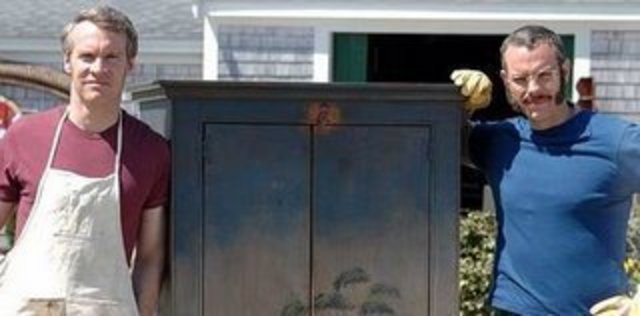Rent Boy Goes Primitive

Pascal (right) proves his acting chops on screen with Tate Donovan.
If you went to the Paramount Theatre this week for Silent Movie Mondays, you probably noticed there were already people camped out in lawn chairs to get rush tickets for Rent, which opened the next night.
“I’m just amazed at the popularity this show still has,” actor Adam Pascal told me in a recent phone interview. “It’s just incredible.”
Pascal was 26 in 1996 when he originated the role of HIV-positive musician Roger Davis in the late Jonathan Larson’s Broadway musical sensation that updated La bohème into the tale of a group of artistic bohemians fighting for their lives and labor in modern-day New York City. Pascal and fellow original costar Anthony Rapp have now returned to the show that made their names for this new tour.
And you’re not alone if you’re thinking that two thirtysomethings might make better leads for a musical called Mortgage.
“We had to be mentally ready to come back,” Pascal admitted. “There’s a lot of baggage with this show and the history of the show and whether people are going to think we’re too old—all those questions you psych yourself out with.” For the record, there’s only one reference in the show to any character’s age (heroine Mimi says she’s 19). And Pascal, who like Rapp had already revisited his role for the 2005 film version as well as a brief Broadway return in the summer of 2007, feels he’s got something fresh to bring to something so familiar.
“Anthony and I both agree that what’s new is ourselves,” he said. “The fact that we’re older, the fact that we bring that life experience and, hopefully, maturity and wisdom of having the lives we’ve had these past years—I think that manifests itself in some ways on stage.”
Pascal’s experience also includes a successful run in another opera-turned-musical—he was the original Radames in Elton John’s pop Aida—in addition to an Emcee bow in Cabaret, solo rock albums, and a number of film roles. The most interesting of the latter may prove to be his fine turn as Mr. Gibbs in this year’s American Primitive, in which he plays the lover and business partner of a widower (Tate Donovan) trying to raise two daughters and redefine family values in a Nixon-era Cape Cod. The independent film’s setting, where Pascal has spent over a dozen summers in his wife’s family home, appealed to the actor. But there was a more basic hook.
“I was really intrigued at the idea of playing a gay character on screen,” Pascal confessed. “You know, I’m kissing a guy on screen. It was terrifying. I was like, I wanna do this. Because, really, it’s so not a big deal but it’s a challenge to myself. You don’t always get much rehearsal in a film. And I actually kind of like that. It’s a good skill to learn as a performer: to not be able to find every little moment and then have a long run of a show to develop all of those moments. You have to kind of fly by the seat of your pants”
He meets the challenge with a natural performance that blends quietly into the mostly gentle, unforced period concerns of the film, which doesn’t push an overdone ‘70s wardrobe or soundtrack. Although Pascal sexily sports what could have have been absurd facial hair. He even quizzed me about it. “Hey, can I ask you a question?” he said near the end of our talk. “Did you find those crazy lambchop sideburns I was wearing distracting?” Apparently, those crazy chops didn’t concern the filmmakers until the movie was finished—at which point, Pascal thinks, they went in and “did some digital fixing” to render the cheap prosthetics believable.
Meanwhile, don’t worry about finding him believable in Rent. “It feels so natural to be back in that show,” he said. “I’ve been away from it for long enough—from the original cast and the original incarnation—that now I can come back to it and enjoy it in almost a more pure way.”
But, come on, can you still feel enthused night after night after night in city after city all these years later? “Only if you do it well,” he explained. “You have to figure out a way to give just as good a performance when you’re not feeling it as when you are—because there are going to be times when you’re tired, you’re bored, whatever it is. But the audiences are all paying the same amount of money and deserve that same level of performance. I won’t phone in a performance. I’d be too embarrassed. I’m too vain.”
